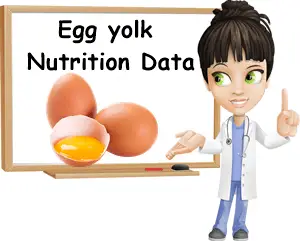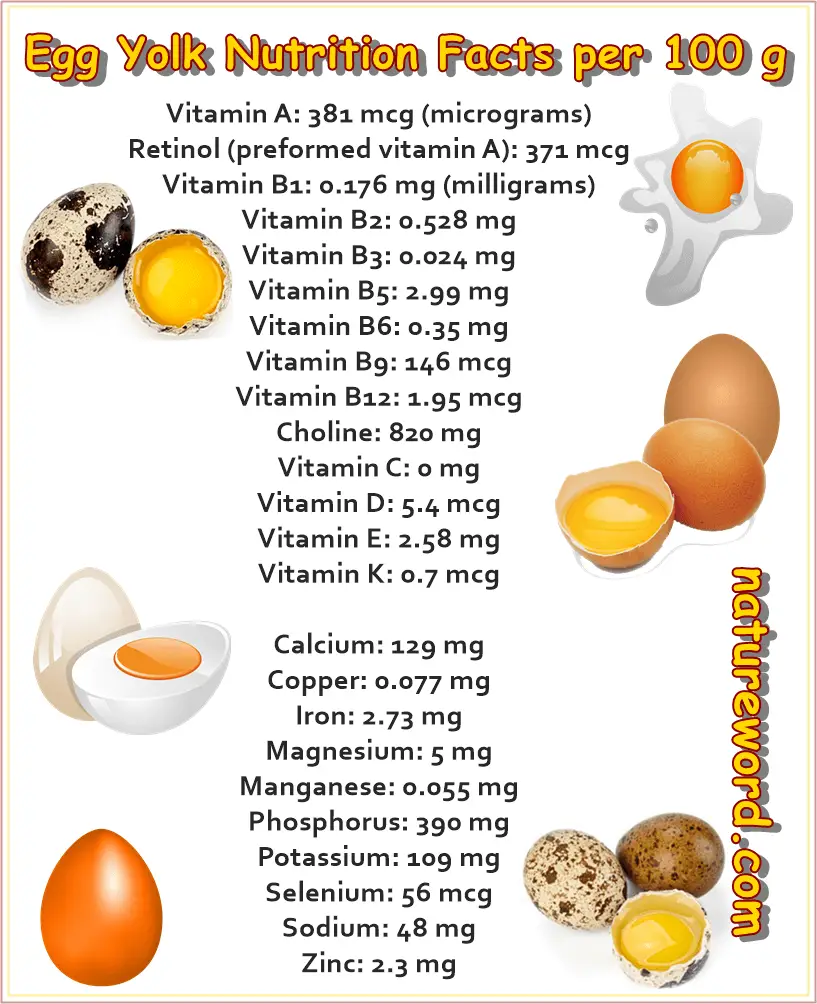Egg yolks are the part of eggs a lot of people avoid because they are high in calories and have a high fat and high cholesterol content. However, the egg yolk houses most of the nutritional value of the egg. Egg yolk nutrition is simply astonishing. Nutrition data shows egg yolks provide more protein than egg white for the same amount. Egg yolk is high in retinol which is preformed vitamin A, phosphorus, selenium, and has a good content of iron and zinc.
When it comes to nutrition facts, know that egg yolk provides 81% of the daily vitamin B12 intake for the average adult per 100 grams. A serving of 100 grams of egg yolk provides over 40% of daily vitamin A requirements, 40% of vitamin B2, 59% of vitamin B5, 20% of vitamin B6, and over 36% of vitamin B9. The same amount contains 149% of daily choline requirements, 27% vitamin E and 27% vitamin D.
Also see the 23 benefits of eating egg yolk.

Egg Yolk Nutrition Facts per 100 g of Raw Yolk
Nutritional values determined for 100 grams of raw egg yolk from chicken eggs. Nutritional data for other varieties of egg may differ.
Macronutrients
- Energetic value (calories): 322 to 328 kcal (kilocalories)
- Carbohydrates content: 3.59 g (grams) (the average adult can eat up to 278 g of carbs per day)
- Fiber content: 0 g
- Sugar: 0.56 g
- Protein content: 15.86 g (the average adult needs 50 g of protein per day)
- Fat content: 26.54 g (the average adult can eat up to 78 g of fat per day)
- Cholesterol: 1085 mg (the average adult can eat up to 300 mg of cholesterol a day)
- Water content: 52.3 g
Vitamins in egg yolk:
- Vitamin A: 381 mcg (micrograms) of which 371 mcg retinol, or preformed vitamin A (42.3% of daily vitamin A requirements)
- Vitamin B1: 0.176 mg (milligrams) (14% of daily vitamin B1)
- Vitamin B2: 0.528 mg (40% of daily vitamin B2)
- Vitamin B3: 0.024 mg (1.5% of daily vitamin B3)
- Vitamin B5: 2.99 mg (59% of daily vitamin B5)
- Vitamin B6: 0.35 mg (20.5% of daily vitamin B6)
- Vitamin B9: 146 mcg (36.5% of daily vitamin B9)
- Vitamin B12: 1.95 mcg (81% of daily vitamin B12)
- Choline: 820 mg (149% of daily choline values)
- Vitamin C: 0 mg (no vitamin C)
- Vitamin D: 5.4 mcg (27% of daily vitamin D)
- Vitamin E: 2.58 mg (27% of daily vitamin E)
- Vitamin K: 0.7 mcg (trace amounts)
Minerals in egg yolk:
- Calcium: 129 mg (9.9% of daily calcium values)
- Copper: 0.077 mg (8.5% of daily copper values)
- Iron: 2.73 mg (15% of daily iron values)
- Magnesium: 5 mg (1.25% of daily magnesium)
- Manganese: 0.055 mg (2.39% values for men and 3% of values for women)
- Phosphorus: 390 mg (over 55% of daily phosphorus requirements)
- Potassium: 109 mg (2.3% of daily potassium requirements)
- Selenium: 56 mcg (over 100% of daily selenium requirements)
- Sodium: 48 mg (only 3.2% of daily sodium requirements)
- Zinc: 2.3 mg (20.9% of daily zinc requirements)
Note: nutritional data for egg yolk from USDA gov.

Egg Yolk Nutrition Facts per 100 g of Cooked Yolk
Nutritional values determined for 100 grams of cooked egg yolk from chicken eggs (no added fat – boiled, poached, baked). Nutritional data for other varieties of eggs may differ.
Macronutrients
- Energetic value (calories): 321 kcal (kilocalories)
- Carbohydrates content: 3.58 g (grams)
- Fiber content: 0 g
- Sugar: 0.56 g
- Protein content: 15.81 g
- Fat content: 26.46 g
- Cholesterol: 1082 mg
- Water content: 52.16 g
Vitamins in cooked egg yolk:
- Vitamin A: 380 mcg (micrograms) of which 370 mcg retinol (preformed vitamin A)
- Vitamin B1: 0.14 mg (milligrams)
- Vitamin B2: 0.5 mg
- Vitamin B3: 0.022 mg
- Vitamin B5: 2.89 mg
- Vitamin B6: 0.332 mg
- Vitamin B9: 109 mcg
- Vitamin B12: 1.56 mcg
- Choline: 654 mg
- Vitamin C: 0 mg
- Vitamin D: 5.4 mcg
- Vitamin E: 2.57 mg
- Vitamin K: 0.7 mcg
Minerals in cooked egg yolk:
- Calcium: 129 mg
- Copper: 0.077 mg
- Iron: 2.72 mg
- Magnesium: 5 mg
- Manganese: 0.055 mg
- Phosphorus: 389 mg
- Potassium: 109 mg
- Selenium: 55.8 mcg
- Sodium: 164 mg
- Zinc: 2.29 mg
Note: nutritional data for cooked egg yolk from USDA.gov.
Observation: There isn’t much of a difference in terms of nutrition between raw egg yolk and cooked egg yolk, when cooking does not employ the use of additional ingredients (e.g. boiled, baked, poached egg yolks). Fresh and cooked egg yolk have about the same nutritional value.
